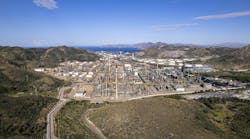By the OGJ Online Staff
HOUSTON, July 25 --- The Union of Concerned Scientists said Tuesday that California is headed for a gasoline crisis as early as next spring.
In a report, UCS said that despite the recent drop in prices at the pump, California should begin reducing gasoline demand or it may face shortages and price shocks next year.
It said demand for gasoline has increased steadily over the past decade and will soon surpass supply. It said the phaseout of methyl tertiary butyl ether, expected to begin next year, will only accelerate the situation.
UCS also claimed, "With refinery control limited to a handful of companies, the market is vulnerable to manipulation. "
The report said, "The combination of less efficient vehicles and increased driving has propelled California's growing demand for gasoline. The sales boom of sport-utility vehicles and light trucks has dragged down the average fuel economy of California's automobiles. Between 1990 and 2000, the percentage of light trucks on California's roads climbed to 35% from 27%. Because light trucks are held to a lower fuel economy standard than cars (25% less), every year California spends an extra $2.4 billion in fuel costs and consumes an additional 1.5 billion gal of gasoline, 11% of the state's total usage.
"As vehicles have become less efficient, the average amount that Californians drive has increased steadily, outpacing the rate of population growth. Between 1970 and 1990, California's population grew 60%, while vehicle miles traveled increased more than 100%."
Patricia Monahan, a UCS analyst and coauthor of the report, said, "If current trends continue, California gasoline use will increase 43% by 2020. To defuse this time bomb, California must curb its demand for oil by using more fuel-efficient vehicles and alternative modes of transportation."
The report said installing fuel-efficient tires, regular servicing of cars, and improved driving habits could cut California gasoline use 10% or more, but the state also should develop and expand consumer incentives for fuel-efficient cars and trucks.

